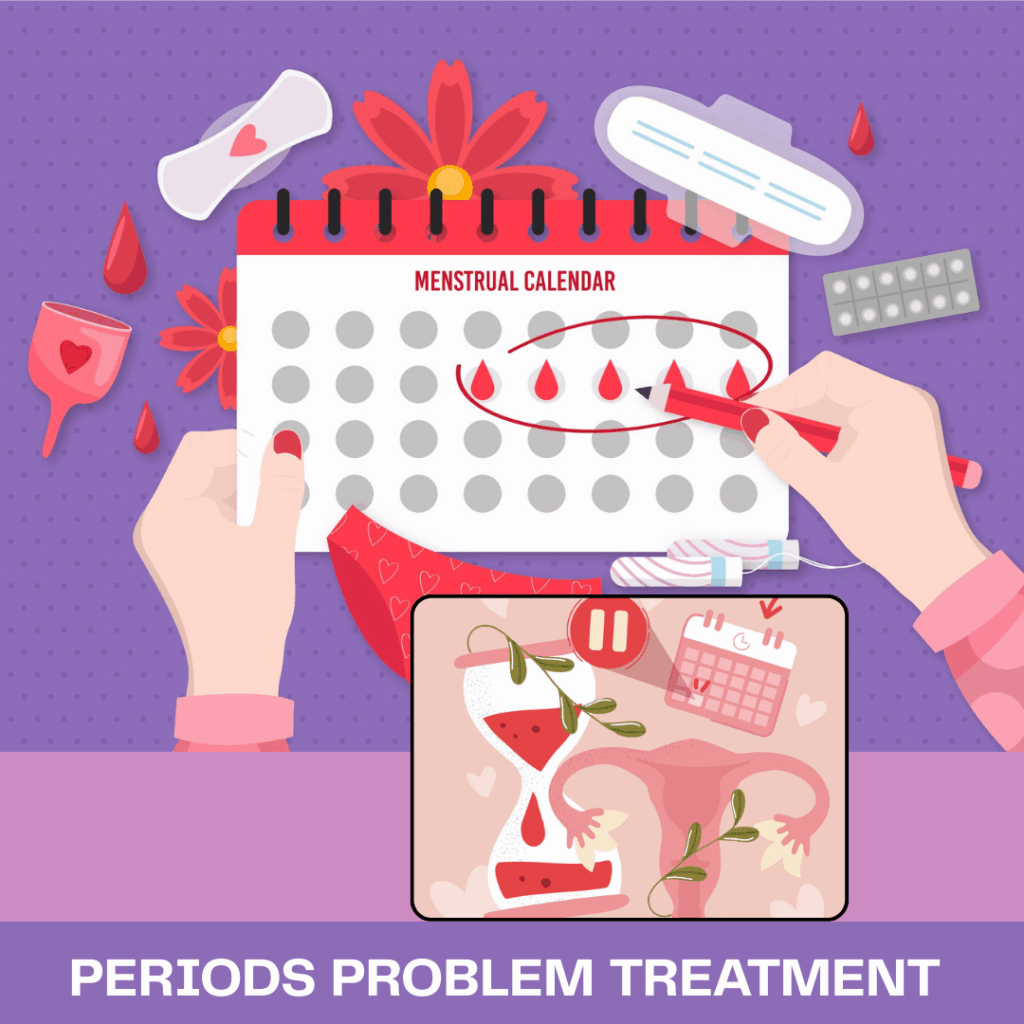
Common Period Problems Faced by Women
Every woman’s menstrual cycle is different, but certain problems are more commonly reported:
1. Irregular Periods
Cycles that are shorter than 21 days or longer than 35 days can be classified as irregular. Skipping periods or having unpredictable timing can indicate hormonal imbalances, stress, or underlying conditions like PCOS.
2. Heavy Menstrual Bleeding (Menorrhagia)
Excessive blood flow, especially if it lasts more than 7 days or includes large clots, may lead to anemia and fatigue.
Cramping and abdominal pain are typical, but if the pain interferes with daily activities, it should not be ignored.
4. Missed Periods (Amenorrhea)
Missing periods without pregnancy can result from extreme stress, significant weight changes, thyroid disorders, or more serious reproductive health conditions.
5. Spotting or Bleeding Between Periods
Mid-cycle bleeding can be triggered by hormonal imbalance, ovulation, fibroids, or even contraceptive use.
Potential Causes of Menstrual Problems
Understanding the root cause of menstrual disturbances is critical for proper treatment. Some of the most common causes include:
- Hormonal Imbalance
An imbalance in estrogen and progesterone can disturb the regular menstrual rhythm. - Polycystic Ovary Syndrome (PCOS)
A leading cause of irregular or missed periods, PCOS affects many women in their reproductive years. - Thyroid Dysfunction
Irregular menstrual cycles can be linked to both underactive and overactive thyroid conditions. - Fibroids or Endometriosis
These conditions often cause heavy bleeding, pain, or spotting. - Lifestyle Factors
Stress, excessive exercise, rapid weight gain or loss, and poor diet can also affect menstrual health.
How Are Period Problems Diagnosed?
A gynecologist will begin by understanding your medical history and cycle pattern. Diagnostic steps may include:
- Physical and pelvic examination
- Laboratory blood analysis to assess hormonal balance, evaluate thyroid performance, or identify signs of anemia.
- Pelvic ultrasound to detect fibroids, cysts, or uterine abnormalities
- Pap smear or other tests if cervical issues are suspected
These assessments help determine whether the issue is hormonal, structural, or related to lifestyle.
Effective Treatments Available in Kharadi
Kharadi, being a growing urban hub in Pune, has access to several reputed gynecologists, diagnostic labs, and clinics equipped to address menstrual disorders.
Treatment options include:
- Lifestyle Modifications
Doctors often recommend regular exercise, a balanced diet, and stress management techniques. - Hormonal Medications
Birth control pills or hormone therapy may be prescribed to regulate cycles or reduce excessive bleeding. - Treatment for Underlying Conditions
Conditions like PCOS, thyroid issues, or endometriosis require targeted management.
- Iron Supplements
For women with heavy bleeding-induced anemia, iron supplements are often part of treatment. - Pain Management
To manage cramping and inflammation, non-steroidal anti-inflammatory drugs may offer effective relief.
In certain cases, surgical interventions like removal of fibroids or laparoscopic treatment may be recommended if medication alone is not effective.
When Should You See a Doctor?
It’s important not to normalize menstrual issues or delay medical consultation. You should visit a doctor if:
- Your periods are consistently irregular or absent
- You bleed heavily for more than 7 days
- You experience unbearable menstrual cramps
- There is bleeding between cycles
- You’re experiencing symptoms such as excessive hair growth, persistent acne, or unexpected weight gain.
Early intervention not only prevents complications but also offers better control and relief.
Can Menstrual Issues Be Prevented?
Although not all menstrual disorders can be prevented, you can lower your risk by:
- Maintaining a healthy weight
- Managing stress through yoga, meditation, or therapy
- Following a nutritious diet rich in iron and calcium
- Staying physically active
- Scheduling annual gynecology checkups
FAQs on Periods Problem Treatment
1. Are irregular periods normal after teenage years?
2. Can PCOS cause period problems?
3. How can I track my menstrual cycle?
4. Is hormonal treatment safe?
Conclusion
Menstrual problems may be common, but they shouldn’t be ignored. Irregular cycles, pain, or excessive bleeding can often signal deeper health concerns that need timely evaluation. Accessing expert Periods Problem Treatment in Kharadi ensures that you receive proper diagnosis, personalized care, and long-term relief. Taking control of your menstrual health is not just about comfort — it’s about protecting your reproductive and overall well-being.
